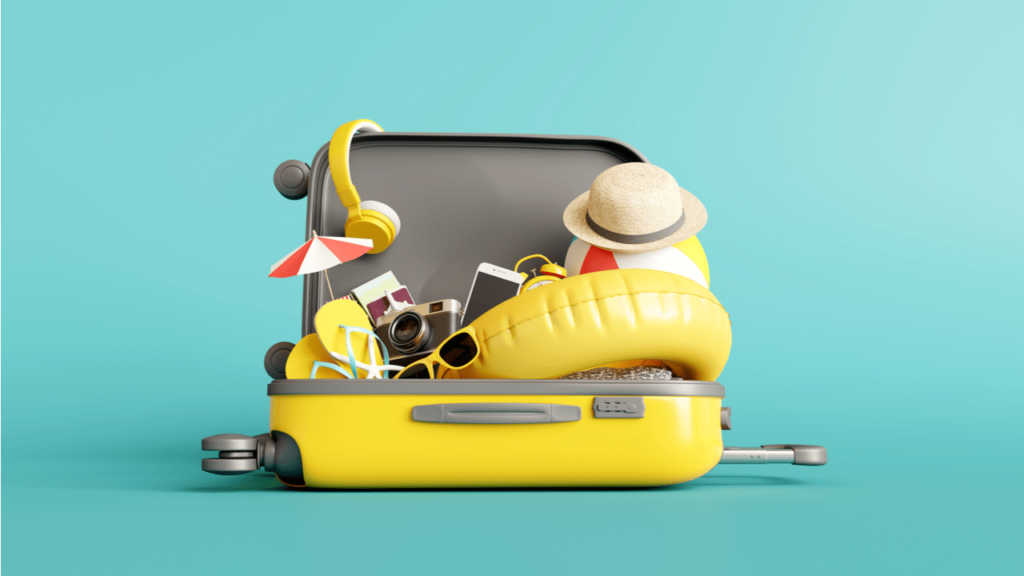In order to get a good grade on the IELTS speaking test, you need to answer questions asked by the examiner using proper vocabulary related to the context. Learning proper pronunciation and vocabulary is important to sound like native speakers who know the English language. Theme-specific questions will be asked in parts 2 and 3 of the speaking test. In this article, we will look into travel vocabulary and useful phrases to improve them.

Vocabulary for Tourism: Vacation
Your speaking test might involve questions related to travelling to foreign places and how you will make arrangements for it. To answer such questions, you need to know relevant travel vocabulary that you can use during your speech.
The following are some of the common words that you can use to enhance your travel vocabulary:
| Word | Synonyms | Meaning | Usage |
|---|---|---|---|
| Voyage | Journey, Trip | (Noun) It is a long journey to very distant places, especially through the sea. | A ship can face a lot of turbulence during its voyage |
| Sight-seeing | Excursion, Tour | (Noun) It is the act of visiting different places that one is interested in. | People only post their best sightseeing pictures on Twitter |
| Travel Agent | Holiday Company, Travel Agency | (Noun) It is a person who sells or makes arrangements for transportation, accommodation and tours for people who are travelling. | Hiring a travel agent makes the job of putting together holiday plans easier |
| Accommodation | Lodging, living quarters | (Noun) It is a room or building where a person can stay for a short time or live for a long time. | It is very hard to look for good accommodation during the holiday season |
| Hostel | Youth Hostel, Bed and Breakfast | (Noun) It is a place that provides accommodation and inexpensive food to a particular group of people such as travellers, students, etc. | It is cheaper to book a place in a hostel than in a hotel when travelling to foreign places |
IELTS Travel Vocabulary: Public Transport Systems
Crack IELTS Exam in first attempt
Attend Leap’s free masterclass to get tips, tricks and advance strategies to crack IELTS exam in first attempt

Public transport systems are referred to by different terms in different countries. It doesn’t take much time for a new learner to remember these words. Some words seem very similar, but they are used to refer to different things. So it is important to learn the difference between these words to improve your English vocabulary.
Here are a few words to get you started.
| Word | Synonyms | Meaning | Usage |
|---|---|---|---|
| Voyage | Journey, Trip | (Noun) It is a long journey to very distant places, especially through the sea. | A ship can face a lot of turbulence during its voyage |
| Sight-seeing | Excursion, Tour | (Noun) It is the act of visiting different places that one is interested in. | People only post their best sightseeing pictures on Twitter |
| Travel Agent | Holiday Company, Travel Agency | (Noun) It is a person who sells or makes arrangements for transportation, accommodation and tours for people who are travelling. | Hiring a travel agent makes the job of putting together holiday plans easier |
| Accommodation | Lodging, living quarters | (Noun) It is a room or building where a person can stay for a short time or live for a long time. | It is very hard to look for good accommodation during the holiday season |
| Hostel | Youth Hostel, Bed and Breakfast | (Noun) It is a place that provides accommodation and inexpensive food to a particular group of people such as travellers, students, etc. | It is cheaper to book a place in a hostel than in a hotel when travelling to foreign places |
Crack IELTS Exam in first attempt

Attend Leap’s free masterclass to get tips, tricks and advance strategies to crack IELTS exam in first attempt
IELTS Travel Vocabulary: Bookings & Process
A common topic related to travel is how to book tickets and how the journey of travelling takes place in different modes of transportation. In this section, we will look into some words that can be used to describe your journey in different travelling modes.
| Word | Synonyms | Meaning | Usage |
|---|---|---|---|
| Passport | Travel document | (Noun) It is an official document issued by a government to an individual to authenticate their identity and citizenship and enable them to travel overseas to other countries. | People without passports cannot travel to another country |
| One-Way Ticket | Single ticket | (Noun) It is a ticket that allows a person to travel from one place to another. The person cannot use the ticket to travel back to where they came from. | A one-way ticket is sometimes more expensive than a two-way ticket. |
| Return Ticket | Round-trip ticket, Two-way ticket. | (Noun) It is a ticket that someone can use to travel to a place and return to the original place. | A return ticket from Poland to India costs around 1000 Euros. |
| First-class | First-rate, High quality. | (Adjective) It is the highest standard and most expensive class of travel seats and service in a train, flight, ship or bus. | Many people wish to buy first-class flight tickets but can’t afford them. |
| Business Class | – | (Adjective) It is a travel class in airlines above economy class and premium class. It has upgraded services compared to the other two classes. | There are sections in an aircraft to separate business class travellers from economy class travellers. |
| Boarding Pass | Boarding card | (Noun) It is an official document issued by an airline to its passengers allowing them to board the airline for a flight. | Peter checked in for the flight to get his boarding pass |
| Departure Lounge | Lounge, waiting room | (Noun) It is a waiting room in an airport where the passengers wait before boarding their flight | Waiting at the departure lounge makes some people anxious. |
| Aisle Seat | Passageway | (Noun) It is a seat that is either on or next to an aisle. | People in the aisle seat can walk out of their seats easier than people sitting beside the window seat. |
Additional Travel Related Vocabulary
Different words can be used to refer to different types of bags. Though all of them seem to refer to the same thing, they all actually mean very different things. The following are some of the different types of bags that are used:
| Word | Synonym | Meaning | Usage |
|---|---|---|---|
| Baggage | Luggage Trunk | (Noun) A general term used to refer to suitcases and bags containing personal belongings and things that are usually used during travel. | People have to wait at the baggage terminal in airports to claim their bags. |
| Back Pack | Rucksack Packsack | (Noun) A bag that has shoulder straps and can be carried on one’s back. | Hikers usually use a backpack when they travel for ease of carrying their belongings. |
| Hand Luggage | Handbag Duffel bag | (Noun) A small-sized suitcase or bag that can be carried by a passenger in an aeroplane | Air travellers carry their laptops in their hand luggage |
| Suitcase | Briefcase, Travel Bag | (Noun) It is a case that has a handle and a hinged lid used for carrying clothes, belongings and important documents | People prefer to use suitcases during a business trip for the ease of carrying important documents with them at all times. |
IELTS Travel Essay
Now that you know so many words and phrases related to travel. Why not try and attempt to frame answers around it? To help you get started, we have a sample question and answer that you can use for reference.
Related: Essay Topic On Studying Abroad
More people are travelling now than ever before. What do you think is the reason behind it? Give reasons for your answer.
People lived all their lives in the place they were born in and only ever travelled when they had a reason to, such as for work or medical reasons. With more access to technology, cheaper travel modes, exposure to cultures and knowledge of different countries, more people are travelling than ever before.
One of the most important reasons people travel is to relieve their everyday stresses and get pleasure in a different environment. People use the time away during school year-end holidays or take a break from their work and travel to other places both within and outside their country to have a change of atmosphere and enjoy the free time they get.
The second reason is increased work and business opportunities. With increased networking nowadays, people have the chance to work in places out of their native place. Entrepreneurs also travel to new places to acquire talent, technologies and knowledge that they cannot get from the place they are based in.
With more exposure to different cultures through television and movies, people want to experience it themselves. The advent of the Hallyu wave and the development of the tourism industry in South Korea is a great example of how the entertainment industry influences people to travel to different places.
To sum it up, people want to gain more experience and opportunities. Travelling is a great opportunity for people to get just that. With more inexpensive modes of transport available today, the travel and tourism industry is only expected to develop more.
You can read more on topic wise vocabulary here- Covid Vocabulary, education, food

Conclusion
Competence in the English language requires you to understand the different elements of language learning, including enunciation, pronunciation, collocations and vocabulary. It is also a good idea to learn useful phrases in the English language.
You can check out our blog posts to learn new words and phrases to enrich your vocabulary related to travel and vocabulary on other important topics. Mastering all the important words and using them in meaningful sentences that sound natural is the key to acing your IELTS speaking and writing tests.
Frequently Asked Questions
How can I improve my travel vocabulary for IELTS?
Ans. The best way to improve your vocabulary for IELTS is by increasing the range of words you know for a given topic. For improving travel vocabulary, you can create sets of travel collocations, synonyms and travel expressions and practice using them in sentences. This will help you increase your travel vocabulary faster.
How much travel vocabulary is enough for IELTS?
Ans. Native speakers usually learn up to 20,000 words by the time they become graduates, even though the number of words they use on a day-to-day basis is very less. As someone preparing for IELTS, you need to learn at least 6000-7000 words to improve your vocabulary and get better scores.
This 7000-word count includes all the different possible topics that could come up for the IELTS exam. For the topic of travel and tourism, you need to learn a minimum of 100 words, including phrases, synonyms, collocations, common expressions and idioms.
How can I improve my travel vocabulary for IELTS writing task 2?
Ans. The IELTS writing task 2 requires you to write an essay on a given topic for at least 250 words. Doing well on this task is an easy way to get higher scores. You can go through sample topic questions and brainstorm all the vocabulary you can use relevant to the topic. Prepare yourself to write the essay in a four-subheading format: introduction, a paragraph supporting the question, a paragraph contrasting the question and a conclusion passage. This way, you can train yourself to use certain vocabulary based on the context of the writing task.






